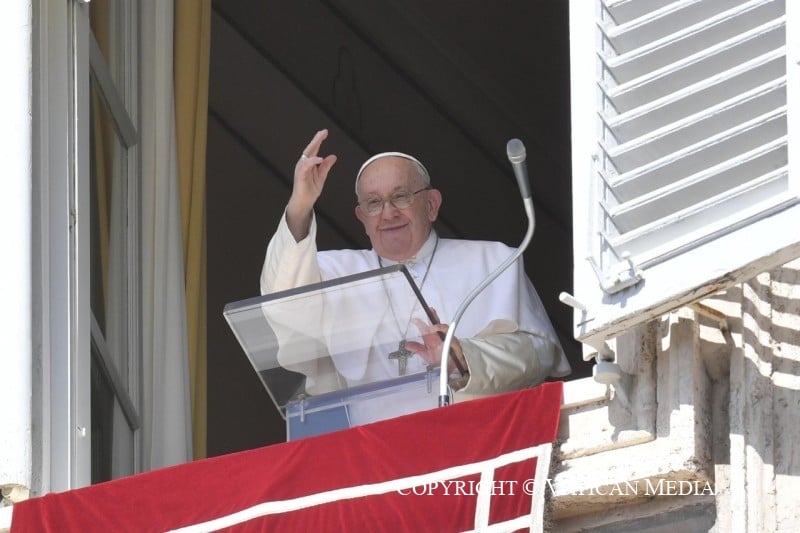At 12 noon today, the Holy Father Francis looked out of the studio window in the Vatican Apostolic Palace to recite the Angelus with the faithful and pilgrims gathered in St. Peter’s Square.
These were the Pope’s words in introducing the Marian prayer:
Before the Angelus
Dear brothers and sisters, buongiorno!
Today’s Gospel presents us a surprising parable: the master of a vineyard goes out from the first dawn until evening to call in some workers, but in the end, he pays everyone equally, even those who have only worked one hour (cf. Mt 20:1-16). It would seem an injustice, but the parable is not to be read through wage criteria; rather, it intends to show us the criteria of God, who does not calculate our merits, but loves us as children.
Let us look more closely at two divine actions that emerge from the story. First, God goes out at all hours to call us; second, He repays everyone with the same “coin”.
First, God is He who goes out at all hours to call us. The parable says that the master “went out early in the morning to hire labourers for his vineyard” (v. 1), but then continues to go out at various times of the day until sunset, to look for those whom no one had yet taken to work. We thus understand that in the parable the workers are not only men, but above all God, who goes out all day without tiring. This is how God is: He does not wait for our efforts to come to us, He does not make an examination to assess our merits before seeking us out, He does not give up if we are late in responding to Him; on the contrary, He Himself has taken the initiative and in Jesus has “come out”-to us, to show us His love. And He seeks us at all hours of the day, which, as Saint Gregory the Great states, represent the different stages and seasons of our life up to old age (cf. Homilies on the Gospel, 19). For His heart, it is never too late; He is always looking for us and waiting for us. Let us not forget this: the Lord always seeks us and awaits us, always!
Precisely because He is so big-hearted, God – this is the second action – repays everyone with the same “coin”, which is his love. Here is the ultimate meaning of the parable: the labourers of the final hour are paid like the first because, in reality, God’s is a superior justice. It goes further. Human justice says to “give to each his own according to what he deserves”, while God’s justice does not measure love on the scales of our returns, our performance or our failures: God just loves us, He loves us because we are his children, and He does so with an unconditional love, a freely-given love.
Brothers and sisters, sometimes we risk having a “mercantile” relationship with God, focusing more on our prowess than on the generosity of his grace. Sometimes even as the Church, instead of going out at all hours of the day and extending our arms to all, we can feel like the first in our class, judging others far away, without thinking that God loves them too with the same love He has for us. And even in our relationships, which are the fabric of society, the justice we practise sometimes fails to break out of the cage of calculation, and we limit ourselves to giving according to what we receive, without daring to go the extra mile, without counting on the effectiveness of good done freely and love offered with a broad heart. Brothers, sisters, let us ask ourselves: do I, a Christian, know how to go out towards others? Am I generous towards everyone, do I know how to give that extra understanding and forgiveness, as Jesus has done and does every day with me?
May Our Lady help us to convert to God’s measure: that of a love without measure.










